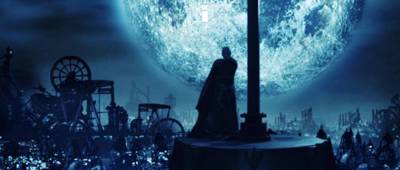Casshern

Casshern is a harsh anti-war genre picture which is cribbed from various manga sources, Mamoru Oshii and Blade Runner. It is uneven and nowhere near successful, but has moments of brilliance.
A future japanese society has conquered all of asia and much of Europe. But like the Roman's has grown decandent and stagnant. Breakdown of human genetic code is rampant from all the new diseases caused by high-tech weapons and pollution of the empire. When a scientist invents a way to regenerate the DNA code fresh, his lab is attacked by an unknown force in the form of a gigantic stone lightning-bolt. The bodies from the front-lines of the war he was regenerating become supermen and superwoman who create an army to destroy their makers. The scientists Son is also resurrected, and with the help of his fathers collegue's 'high-tech rocket suit' becomes the only force to stop this new enemy.
The strengths of Casshern are it's visuals and not it's storytelling. Like Nightwatch, Immortel, Sky Captain and the World of Tomorrow and Avalon, it is live actors in front of entirely computer generated landscapes. (You may note from some of my previous posts that I'm on this sort of kick right now). If Blade Runner's urban sprawl is chaotic capitalism gone out of control, then Casshern's empire-capital is some weird fusion of Maoist China and Nazi Germany all through a Japanese filter. The story is told in an oblique manner, with many structural holes left to be filled in by the viewer. For example, when the super-humans are resurrected the head towards the mountains and find a large fortress completely equipped with a robot army for their use. Why there was a fortress with an army which can be deployed by just a few individuals is never referred to at any time.
I was disappointed with Casshern more than I was impressed. The big saving grace was that with only a few exceptions, the characters were not black and white (even though all are still two dimesional cut-outs), doing both good and bad things from emotional conflict. The ultimate message is that war only brings out the worst in humanity, creating an ever-spiraling pool of suffering, vengance, revenges, and hurt. The lengths the ending goes about driving this point home is stronger than many western drama's (I'm talking to you, Saving Private Ryan). Much like Avalon, this is surprising for a genre effort.

0 Comments:
Post a Comment
<< Home